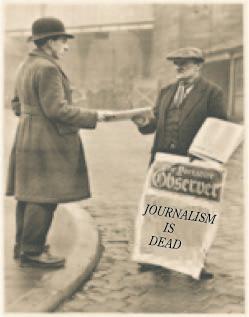Ok, maybe I exaggerate. Journalism isn't quite dead, but the truth in mainstream journalism sure is. And then there's the blogs - a medium where people can express their take on the world at large with no influence of corporate profits, political manipulations or government controls (...for now). AND YES!, there's government control of media in the good ole' USof A!. A recent article (also below) from E&P reported on the new 'Shield Law' also known as the 'Free Flow Information Act' which seems to bring more government control to 'freedom of speech' and 'protection' to journalism therein. Right. The definition of 'free' in this act seems to correspond with the 'freedom' Bush seeks to bring to the world and the 'freedom of speech' that is being largely controlled. The paragraphs that really caught my attention were:
A key reason some journalists oppose the popular federal shield proposal is fear that giving Congress the power to define who is and isn't a journalist could lead effectively to the licensing of journalists.In other remarks about the legislation at IAPA's 61st General Assembly, Lugar acknowledged that the legislation could amount to a "privilege" for reporters over other Americans."I think, very frankly, you can make a case that this is a special boon for reporters, and certainly for their role in freedom of the press," he said. "At the end of the day what we will come out with says there is something privileged about being a reporter, and being able to report on something without being thrown into jail.
In all of this talk of privilege, there is a mounting fear in some journalism circles that the federal government may want to leverage this "privilege" with a federal licensing program of sorts, which is enough to make some people twitch. How else will this dilemma be solved? And two demerits to the person who pops up and says, "false dilemma!"
Shield Law Sponsor: Bloggers 'Probably Not' Considered
Journos
Shield Law Sponsor: Bloggers 'Probably Not' Considered
Journos By Mark Fitzgerald
Published: October 10, 2005 4:17 PM ET
INDIANAPOLIS Bloggers would "probably not" be considered journalists under the proposed federal shield law, the bill's co-sponsor, U.S. Sen. Richard Lugar (R.-Ind.), told the Inter American Press Association (IAPA) Monday afternoon.
Lugar emphasized, however, that debate is not yet closed on how to define a journalist under the proposed law. "
As to who is a reporter, this will be a subject of debate as this bill goes farther along," he said in response to a question from Washington Post Deputy Managing Editor Milton Coleman. "Are bloggers journalists or some of the commercial businesses that you here would probably not consider real journalists? Probably not, but how do you determine who will be included in this bill?"
According to the first draft of the Free Flow of Information Act of 2005, the "covered person" protected by the bill's terms includes "any entity that disseminates information by print, broadcast, cable, satellite, mechanical, photographic, electronic, or other means and that publishes a newspaper, book, magazine, or other periodical in print or electronic form; operates a radio or television station (or network of such stations), cable system, or satellite carrier, or channel or programming service for any such station, network, system, or carrier; or operates a news agency or wire service." The legislation also covers employees, contractors or other persons who "gathers, edits, photographs, records, prepares, or disseminates news or information for any such entity."
A key reason some journalists oppose the popular federal shield proposal is fear that giving Congress the power to define who is and isn't a journalist could lead effectively to the licensing of journalists.
In other remarks about the legislation at IAPA's 61st General Assembly, Lugar acknowledged that the legislation could amount to a "privilege" for reporters over other Americans."
I think, very frankly, you can make a case that this is a special boon for reporters, and certainly for their role in freedom of the press," he said. "At the end of the day what we will come out with says there is something privileged about being a reporter, and being able to report on something without being thrown into jail."
Lugar said he was inspired to write the legislation by the jailing of New York Times reporter Judith Miller. "I've known Judy Miller for many years," he said, adding that they became close when she was reporting on his efforts to dismantle the former Soviet Union's nuclear arsenal.
The bill is necessary to help the United States regain its status as an "exemplar" of press freedom, Lugar told the IAPA. "Even as we are advocating for free press (abroad)... we'd better clean up our own act," Lugar said.Mark Fitzgerald (mfitzgerald@editorandpublisher.com)
is E&P's editor-at-large.Yahoo puts news, blogs side by side
By Eric Auchard Tue Oct 11, 1:24 AM ET
SAN FRANCISCO (Reuters) - Yahoo Inc. (Nasdaq:YHOO - news) said on Monday it will begin featuring the work of self-published Web bloggers side by side with the work of professional journalists, leveling distinctions between the two.
Yahoo News, the world's most popular Internet media destination, is set to begin testing on Tuesday an expanded news search system that includes not only news stories and blogs but also user-contributed photos and related Web links.
The move will further stoke the debate between media traditionalists who want to maintain strict walls between news and commentary and those who argue such boundaries are elitist and undervalue the work of "citizen journalists."Blogs, short for Web logs, are easy-to-publish Web sites where millions of individuals post commentary from political analysis to personal musings, creating a grassroots publishing medium that challenges the authority of established media.
Yahoo said its move to combine professionally edited news alongside the work of grassroots commentators promises to enrich the sources of information on breaking news events."Traditional media doesn't have the time and resources to cover all the stories," Joff Redfern, product director for Yahoo Search said. "It really does add substantially to what you are looking at when you are looking for news."
Yahoo has, in effect, created a three-tier system for finding news that starts with the links to top ten stories and related photographs produced by mainstream news organizations on the main Yahoo News site.
Readers searching for further details will be taken to a second-level news site, which splits the page between news from 6,500 professional sources and links to the hundreds of thousands of blogs available from its syndication service.
Thus the expanded search stops short of blurring all lines between edited news and self-publishing."We do try to demarcate what is mainstream media and what is user-generated content so that there is no confusion there," Redfern said.
Those choosing to dig still deeper can click on "More Blog results..." to be taken to purely user-generated news from blogs, photos and links. This allow the user to search 10 million blogs listed on Yahoo's blo.gs blog tracking service.
The search includes links to many of the 42 million photos on the popular Flickr photo-sharing site, which Yahoo acquired this past spring, as well as to My Web, Yahoo's mechanism for allowing its users to learn from the Web searches of others.
FIGHTING TO DEFINE JOURNALISM
Robert Thompson, a media studies professor at Syracuse University, said it was important to preserve the distinctions between professional journalism and personal commentary.
He defined professional journalism as reporting which adheres to standards of accuracy and writing subjected to an editorial process, and all done with an eye to journalistic ethics, although he said journalism often falls short of these goals.
"There is a distinction between something that has gone through an editorial process as opposed to something put up by someone that has been through none of those processes," Thompson said.
But media critic Jeff Jarvis, author of the blog Buzzmachine (http://www.buzzmachine.com), said major Internet sites such as Yahoo and Google (Nasdaq:GOOG - news) continue to patronize bloggers by treating them as secondary sources of news.
Jarvis, who is a former TV critic for TV Guide and People magazines, mocked the notion that journalists live by a shared set of professional standards, that they are better trained or more trustworthy than the anyone-can-join blog movement.
"What made the voice of the people somehow less important than the paid professional journalist?" he asked. "You don't need to have a degree, you don't need to have a paycheck, you don't need to have a byline," Jarvis said.
"If you inform the public, you are committing an act of journalism," he declared.
1 Responses to “Journalism on the Deadbeat”
Leave a Reply
About me
Previous posts
Archives
Cave writings
| Powered by TagBoard Message Board |
Bloggs
- 911 Blogger
- A Particularly Persistant Point of View
- Another Day in the Empire
- Bahgdad Burning
- Bellaciao Collective
- Blue Ibis
- Catalytic Converter
- Crooks and Liars
- Daily Kos
- Deconsumption
- Earth Changes
- EarthFamilyAlpha
- Free Iraq
- Informed Comment
- In Defence of the Innocent
- Inner Freedom
- Laura Knight Jadczyk
- Importance of Being
- Ponerology
- Mickey Z
- Raising Yousuf
- Real Climate
- Rigorous Intuition
- Tales From the Tea Pot
- The Daily Heretic
- The Open Mind
- Tinfoil Tales
- Signs of the Economic Apocolypse
- Umkahlil
Real News
- Aljazeera
- Alternet
- AntiWar
- Buzzflash
- Common Dreams
- CounterPunch
- Electronic Intifada
- From the Wilderness
- Information Clearing House
- Signs of the Times
- The Truth Seeker
- Truth out
- Wing TV


 |
 |
 |
 |
 |



paxil and wellbutrin
paxil and wellbutrin
paxil and wellbutrin
[url=http://paxil-drug-us.blogspot.com]paxil and wellbutrin[/url]